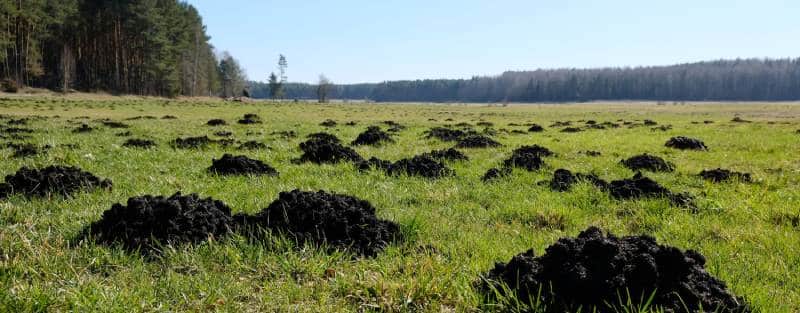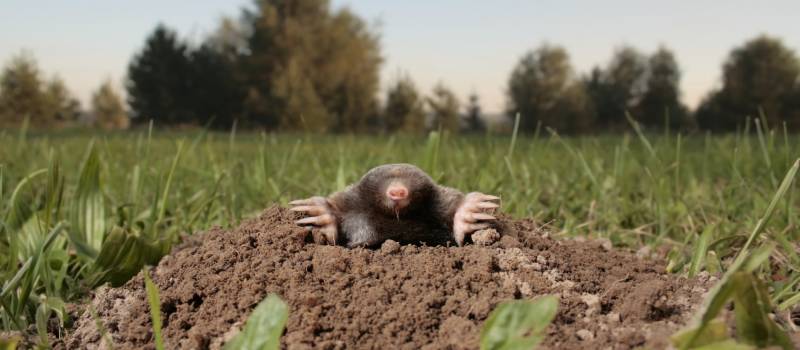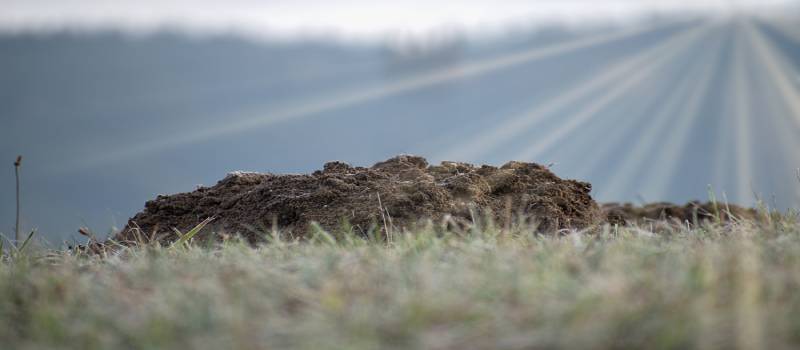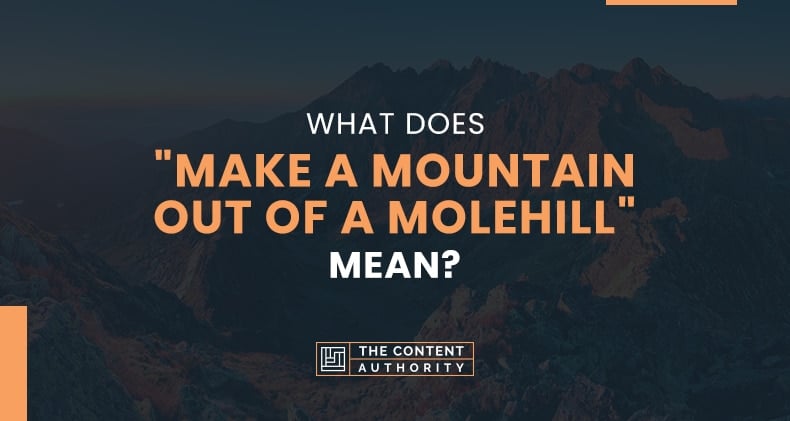As humans, we tend to overreact most of the time. It is a way to not only express ourselves but to make people notice us. Sometimes we do it to our own detriment and force our friends and family to call us out.
Making a mountain out of a molehill is when someone exaggerates the importance of something small. It also means to make a huge problem out of a minor inconvenience. Is making too much out of a minor issue.
It is to exaggerate the severity of a situation.
The phrase can also refer to expecting a lot from someone or something and receiving very little. In this case, it is an idiom that could easily describe the notion of expectations versus reality.
It expresses how someone tries to make an unimportant event seem like something very relevant. It may also depend on who says it. One person, minor inconvenience, could be another severe problem.
Basically, the idea is that someone is using a small situation (the molehill) and creating a big problem (the mountain) out of it. For example, dropping an ice cream sucks, but it’s not that big of a deal. Now, if you start a tantrum, then they’re indeed doing what the idiom is saying.
That’s why it is so frequently used to highlight an exaggeration.
When Was It First Used?

It is unclear when the phrase was originally first used. The only thing that is known is that it is older than 350 years. That means that the phrase was first commonly used in the 17th century—the 1600s.
The phrase appears in a book by British author James Howell. The book contains proverbs of different languages, and it reads: “Making mountains of a molehill.” It was published in 1660.
But, the earliest known use of “Making a mountain out of a molehill” comes from a century earlier in a book from 1548 by English playwright and cleric Nicholas Udall. The quote reads: “The Sophistes of Greece could through their copiousness make an elephant of a flye, and a mountain of a molehill.”
The mountain and molehill part of the quote was added by Udall. But if Udall did not create the idiom, the evidence suggests that it’s relatively new.
By the 1500s, the word “mole” was less than 200 years old. It was an evolution of a larger word that meant “earth-thrower.” It appeared in the late 14th century. The word molehill came a century later.
The comparison between the elephant and the fly in Udall´s book is a Latin proverb collected in another book. This book was written by Dutch author Desiderius Erasmus in the 1500s. Many people say that this type of work by Erasmus was some sort of entertainment. One of his books was presented to the Queen of England for amusement before publishing in 1553.
So there´s more proof that the phrase existed in the 1500s rather than the 1600s. That would make it well over 400 years old instead of 350.
The play “Much ado about nothing,” written by William Shakespeare in 1600, is one that uses the making a mountain out of a molehill into its narrative. The characters in it, through gossip, create a bigger problem than the one that exists.
Shakespeare’s work was mostly based on this notion. But it is the title “Much ado about nothing” that is also a similar idiom meaning “too much made of little.”
In more modern times, the American comedian Fred Allen said that a vice-president is a molehill man that needs to create his mountain by 5 p.m.
What’s The Difference Between A Mountain And A Molehill?

According to Britannica, a mountain is a landform that rises above—exhibiting steep slopes, a confined summit area, and local relief. They rarely occur individually, so they are found in groups. It´s usually above 1000 feet in height.
A molehill is a kind of mound of loose soil created by mammals. In this case, moles and mole rats are digging holes in the earth to live in. This is also the only sign that indicates the presence of these animals.
Imagine a pretty small pitcher’s mound in a baseball game. It is something you can step on.
Between, we have hills.
So the difference is quite something in size. Thus the phrase is trying to say that someone is making a small mound of dirt seem like a towering mountain. Or, in earlier cases, trying to make something feel like an elephant when it is actually a fly.
Also, the mountain has many quotes, phrases, and idioms that use it as a metaphor, while molehill only has this one that we know off. So even in this aspect, the comparison is ridiculous.
How Do I Use It?
The expression is often used by a person denouncing when something is being blown out of proportion. The person that is making mountains out of molehill doesn’t know they are exaggerating something.
So the phrase comes as a response to an action or a comment in which a person completely overreacts about something.
Examples
The boss said that if we don’t deliver this by tomorrow, the company will shut down.
Don´t pay attention to that; he likes to make a mountain out of a molehill, so we deliver in time.
You don’t have to make a mountain out of a molehill cause you gave the wrong answer. You were spot on the rest of the time.
Linda gave you a piece of simple advice, stop trying to make a mountain out of a molehill by being mad at her.
You said it was super hot outside, but walking down the streets, I think you make a mountain out of a molehill cause it’s quite nice.
Does Anybody Ever Use It Today?

It may appear that the phrase is rarely used in the present. But, according to a study by psychologists, it ranks high among over 200 common sayings they tested.
The reason for this is the familiarity and image value that the phrase has. It is easier for a person to have such a visual comparison, like something as big as a mountain to something as small as a molehill.
So, while it may not be used as much as other words or phrases that express the same, it is understandable even if you haven’t heard it or read it before.
More Fun Idioms
Can I Use Other Words Or Phrases That Are Easier To Understand?
Making a mountain out of a molehill is human nature. One tends to exaggerate most of our problems. It is the responsibility of our friends and family to let us know when we are acting out by the slightest inconvenience.
So you may be using many different words or idioms to express this already. The phrases “making a big fuss,” “being dramatic,” “blowing out of proportion.” Simple words like “overreacting” and “overrated” are some examples that we probably use on a weekly basis.
Examples
I only broke one plate; you are making a big fuss about it.
If she didn’t pick up the phone, it doesn’t mean that she hates you. You are being dramatic.
Last night wasn’t that boring. Family dinners are always kind of dull. I still think you are blowing it out of proportion.
I’m sorry, we couldn’t go today. The movie will be showing tomorrow. Stop overreacting.
This artist’s music is overrated. He’s only recorded two albums in his career, and people are already putting him on a pedestal.
What Would Be The Opposite “Making A Molehill Out Of A Mountain” Then?
Making a molehill out of a mountain is also one thing that we tend to do quite often. Either we undervalue something that has great value. Or, on more dangerous ground, we are not able to identify the severity of a problem.
Is thinking you have a fly when you have an elephant. Such a phrase like “play down” and words like “diminish,” “reduce,” or “simplify” can be used to express a contradiction to the phrase.
Examples
You keep playing down the issue when you need to be more focused and pay attention to it.
We are now working late because Mario diminishes the seriousness of the assignment.
He needs to stop reducing his responsibility as a father and act accordingly.
There is no need to make the presentation with more than a couple of slides tomorrow.
No way! You cannot simplify a whole year’s work.
Conclusion
While not using the literal idiom “Make a mountain out of a molehill” and not being familiar with the phrase, we can picture it and know exactly what it means. The clear difference in size between both obstacles helps us visualize the absurdity of comparing one with the other.
It is definitely a commonly used expression because it pointed at something we as people constantly do, which is to exaggerate or be dramatic.
Shawn Manaher is the founder and CEO of The Content Authority. He’s one part content manager, one part writing ninja organizer, and two parts leader of top content creators. You don’t even want to know what he calls pancakes.

